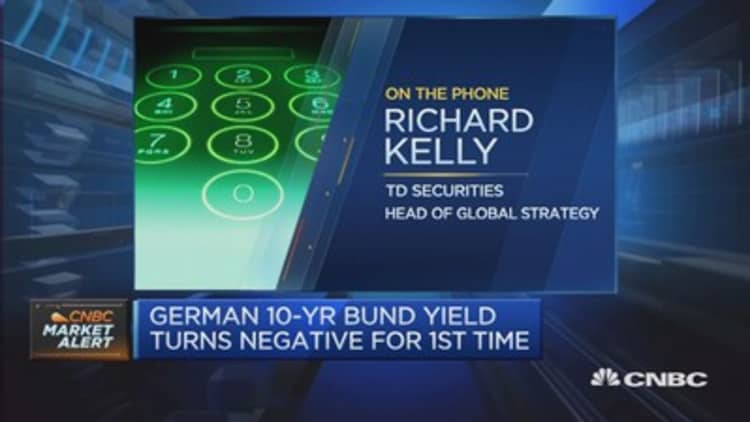
The yield on the 10-year benchmark German bund fell into negative territory for the first time ever on Tuesday morning, amid global growth concerns and jitters over the U.K.'s upcoming referendum on its European Union membership.
At around 8.30 a.m. London time, the yield hit zero and briefly fell into negative territory as investors continued to flock to safe-haven assets. Bond prices and yields move in opposite directions and a negative yield implies that investors are effectively paying the German government for the privilege of parking their cash.
By the end of the European trading day, the yield was still just in negative territory at -0.0020 percent.
A spokesperson for the German Federal Debt Agency spoke immediately after the milestone was reached, stating that the tradability of federal securities is "still very high."
"The federal debt-management strategy is long-term, therefore, the current absolute yield level plays only a subordinate role. Our target remains a sustainable balance between cost and planning security for the debt portfolio," the agency said in an email to CNBC.
The move comes as the European Central Bank has ramped up its bond buying program in recent months as well as investor uncertainty over whether the U.K. will stay in the European Union.
The latter is sparking volatility across financial markets with a beneficiary of the tumult being government bonds. The latest trigger has been two new polls out of the U.K. which showed the Brexit camp is gaining momentum.
An ORB poll for the Telegraph showed 48 percent of Britons would vote to remain in the European Union, while 49 percent would vote to leave.
A YouGov poll for the Times of London showed 46 percent preferred to leave, while 39 percent wanted to remain. Popular British newspaper The Sun also endorsed the leave vote for the upcoming referendum vote on June 23.
"We don't know what is happening with Brexit," said Gareth Nicholson, an investment manager at Aberdeen Asset Management Asia. "The thing we can agree on is that the market volatility is going to increase...the volatility is not good for the broader markets, and that's why you see weakness in foreign exchange and equity."
VIX spikes



The CBOE Volatility Index, widely considered the best gauge of fear in the market, spiked above 21 for the first time since Feb. 25 on Monday while major equity indexes sold off.
The British pound traded at $1.4163 against the dollar Tuesday afternoon Asia time, compared to levels around $1.4600 in late May.
As investors scurried out of riskier assets, they have found comfort in bonds. To be sure, expectations of interest rates staying lower for longer have also supported bonds.
The 10-year Treasury yield was near 1.61 percent on Monday afternoon local time, around its lowest since Feb. 11. The yield on the 10-year and 30-year British government bonds, known as the gilts, also hit record lows on Tuesday morning.
Moves in some bond markets have been even more extreme. The 10-year Japanese government bond yield was at a record low of minus 0.163 percent on Tuesday afternoon.



